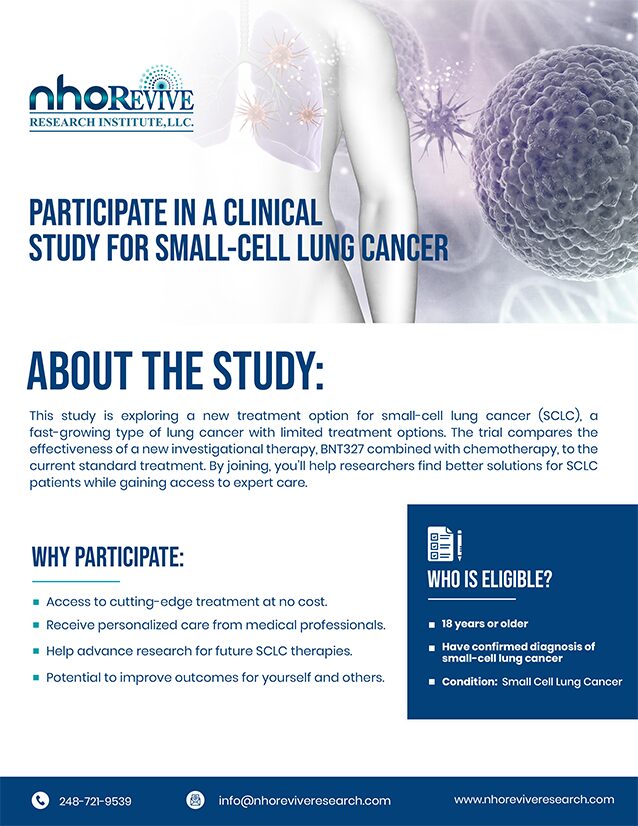NHO Revive is offering Small Cell Lung Cancer Clinical Trials in Nebraska to explore investigational treatments for Small Cell Lung Cancer.
Join a Small Cell Lung Cancer Clinical Trial Today
Understanding Small Cell Lung Cancer and Its Complications
Potential Treatments for Small Cell Lung Cancer
Small Cell Lung Cancer (SCLC) is an aggressive form of lung cancer that spreads quickly and requires immediate medical attention. While standard Small-Cell Carcinoma treatments such as chemotherapy and radiation therapy exist, researchers are constantly exploring new therapies through SCLC Clinical Trials in Nebraska.
By participating in Small Cell Lung Cancer Clinical Trials, patients may gain access to investigational treatments for Small Cell Lung Cancer that are not yet widely available. These innovative therapies aim to target cancer cells more effectively, improve survival rates, and enhance the quality of life for patients.
You might be eligible for Small Cell Lung Cancer Clinical Trials if you:
- Have been diagnosed with Small Cell Lung Cancer
- Experience Small-Cell Carcinoma Symptoms such as persistent cough, chest pain, or shortness of breath
- Have undergone previous Small-Cell Carcinoma treatments but are seeking alternative options
Eligibility is subject to medical evaluation and trial-specific criteria.
Exploring and Learning About Small Cell Lung Cancer
SCLC is known for its rapid progression and high recurrence rate. It often presents with Small-Cell Carcinoma Symptoms such as unexplained weight loss, persistent coughing, wheezing, and difficulty breathing. Since early detection is crucial, participating in SCLC Clinical Trials can open doors to innovative treatment strategies designed to slow disease progression and improve survival outcomes.
At NHO-Revive, our mission is to advance lung cancer research through Small Cell Lung Cancer Clinical Trials in Nebraska. Our ongoing trials focus on evaluating potential new therapies that may offer better results compared to current standard treatments.
What to Expect
Participating in Small Cell Lung Cancer Clinical Trials involves a thorough screening process to determine eligibility. Our research team will guide you through:
- Initial consultation and eligibility assessment
- Comprehensive medical history review
- Access to investigational therapies under medical supervision
- Ongoing monitoring and follow-ups to track progress and ensure safety
By joining an SCLC Clinical Trial, you play a vital role in shaping the future of lung cancer treatments while potentially benefiting from advanced medical interventions.
Age
18 Years and Older
Gender
All genders
Location
Nebraska

300
Advancing Treatment for Small Cell Lung Cancer
The small cell lung cancer study tests a new treatment combined with chemotherapy for extensive-stage small cell lung cancer (ES-SCLC). The study drug helps the immune system fight cancer and slows tumor growth.
This study compares the study drug to the current standard treatment to see which helps patients live longer.
Frequently Asked Questions
Interested in learning more about our research? Explore our frequently asked questions to gain knowledge about this condition.
Has anyone beat small cell lung cancer
While small cell lung cancer (SCLC) is an aggressive type of cancer, early detection and advancements in treatments have allowed some patients to achieve remission. Outcomes vary based on the stage at diagnosis, overall health, and response to treatment. Clinical trials often provide access to innovative therapies that may improve survival rates.
What are the typical symptoms of SCLC?
Common symptoms of SCLC include persistent coughing, chest pain, difficulty breathing, fatigue, unexplained weight loss, and hoarseness. In advanced stages, symptoms may include swelling in the face or neck and neurological issues due to cancer spreading.
How is patient safety ensured in clinical trials?
Clinical trials prioritize patient safety through rigorous monitoring by medical experts and adherence to strict protocols. Participants are informed of potential risks and receive comprehensive care, including routine assessments to manage side effects.
How can early small cell lung cancer be detected?
Early detection of SCLC often involves imaging tests like chest X-rays or CT scans, especially for high-risk individuals, such as smokers. Screening programs for those at risk may help detect the disease before symptoms appear.
What are the potential benefits of participating in small cell lung cancer clinical trials?
Clinical trials may provide access to cutting-edge treatments not yet widely available. Participants contribute to advancing medical research and may benefit from enhanced care and monitoring throughout the study.





